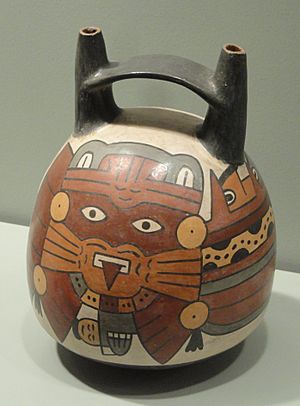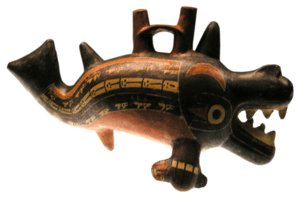Double spout and bridge vessel facts for kids


Imagine a special kind of pot or bottle used long, long ago in ancient Peru! It was called a double spout and bridge vessel. These cool containers were usually made of ceramic (like pottery) and were used for drinking. They first appeared sometime before 500 BC, made by native groups living along the Peruvian coast.
What made them unique? They had two spouts (like little pouring lips) and a handle that connected them, like a bridge! Two ancient groups of people, the Paracas culture and later the Nazca culture, were famous for making these vessels.
At first, the Paracas people carved simple designs onto their pots. These designs often looked like art from the Chavín culture. But over time, they got really good at making their vessels look like sculptures, with thinner walls. The Nazca people took this even further! Their vessels were often shaped like animals or people, and they used many bright colors to decorate them.
How They Were Made
These amazing vessels were built using a method called the coil method. Imagine rolling clay into long snakes and then coiling them up, one on top of the other, to build the shape of the pot.
The Nazca artists were very clever with colors. They used something called 'slip' – which is like liquid clay mixed with colors – to paint their vessels before they were baked in a hot oven. This made the colors super bright and long-lasting! The Paracas people painted their pots after baking, which didn't make the colors as strong. After the Nazca vessels were baked, they were often polished to make them shine even more.
Why Were They Used?
Both the Paracas and Nazca people seemed to use these special vessels for important ceremonies or rituals. We know this because many of them have been found in ancient graves. This suggests they were important items, perhaps used in religious practices or as offerings for the afterlife.
See also
 In Spanish: Botella de doble pico y asa puente para niños
In Spanish: Botella de doble pico y asa puente para niños
 | Selma Burke |
 | Pauline Powell Burns |
 | Frederick J. Brown |
 | Robert Blackburn |

